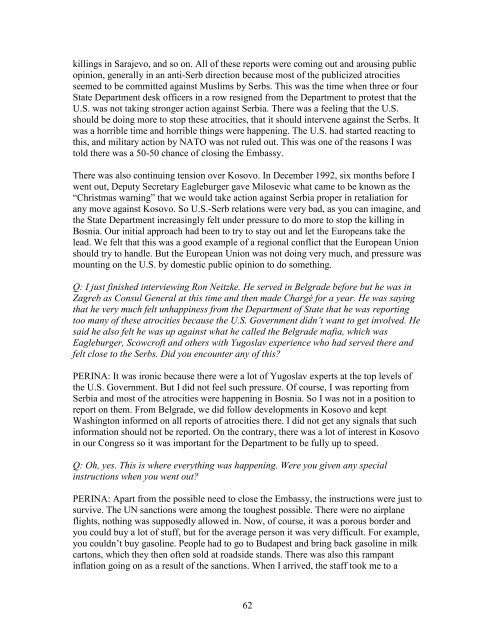ambassador rudolf v. perina - Association for Diplomatic Studies and ...
ambassador rudolf v. perina - Association for Diplomatic Studies and ...
ambassador rudolf v. perina - Association for Diplomatic Studies and ...
Create successful ePaper yourself
Turn your PDF publications into a flip-book with our unique Google optimized e-Paper software.
killings in Sarajevo, <strong>and</strong> so on. All of these reports were coming out <strong>and</strong> arousing public<br />
opinion, generally in an anti-Serb direction because most of the publicized atrocities<br />
seemed to be committed against Muslims by Serbs. This was the time when three or four<br />
State Department desk officers in a row resigned from the Department to protest that the<br />
U.S. was not taking stronger action against Serbia. There was a feeling that the U.S.<br />
should be doing more to stop these atrocities, that it should intervene against the Serbs. It<br />
was a horrible time <strong>and</strong> horrible things were happening. The U.S. had started reacting to<br />
this, <strong>and</strong> military action by NATO was not ruled out. This was one of the reasons I was<br />
told there was a 50-50 chance of closing the Embassy.<br />
There was also continuing tension over Kosovo. In December 1992, six months be<strong>for</strong>e I<br />
went out, Deputy Secretary Eagleburger gave Milosevic what came to be known as the<br />
“Christmas warning” that we would take action against Serbia proper in retaliation <strong>for</strong><br />
any move against Kosovo. So U.S.-Serb relations were very bad, as you can imagine, <strong>and</strong><br />
the State Department increasingly felt under pressure to do more to stop the killing in<br />
Bosnia. Our initial approach had been to try to stay out <strong>and</strong> let the Europeans take the<br />
lead. We felt that this was a good example of a regional conflict that the European Union<br />
should try to h<strong>and</strong>le. But the European Union was not doing very much, <strong>and</strong> pressure was<br />
mounting on the U.S. by domestic public opinion to do something.<br />
Q: I just finished interviewing Ron Neitzke. He served in Belgrade be<strong>for</strong>e but he was in<br />
Zagreb as Consul General at this time <strong>and</strong> then made Chargé <strong>for</strong> a year. He was saying<br />
that he very much felt unhappiness from the Department of State that he was reporting<br />
too many of these atrocities because the U.S. Government didn’t want to get involved. He<br />
said he also felt he was up against what he called the Belgrade mafia, which was<br />
Eagleburger, Scowcroft <strong>and</strong> others with Yugoslav experience who had served there <strong>and</strong><br />
felt close to the Serbs. Did you encounter any of this?<br />
PERINA: It was ironic because there were a lot of Yugoslav experts at the top levels of<br />
the U.S. Government. But I did not feel such pressure. Of course, I was reporting from<br />
Serbia <strong>and</strong> most of the atrocities were happening in Bosnia. So I was not in a position to<br />
report on them. From Belgrade, we did follow developments in Kosovo <strong>and</strong> kept<br />
Washington in<strong>for</strong>med on all reports of atrocities there. I did not get any signals that such<br />
in<strong>for</strong>mation should not be reported. On the contrary, there was a lot of interest in Kosovo<br />
in our Congress so it was important <strong>for</strong> the Department to be fully up to speed.<br />
Q: Oh, yes. This is where everything was happening. Were you given any special<br />
instructions when you went out?<br />
PERINA: Apart from the possible need to close the Embassy, the instructions were just to<br />
survive. The UN sanctions were among the toughest possible. There were no airplane<br />
flights, nothing was supposedly allowed in. Now, of course, it was a porous border <strong>and</strong><br />
you could buy a lot of stuff, but <strong>for</strong> the average person it was very difficult. For example,<br />
you couldn’t buy gasoline. People had to go to Budapest <strong>and</strong> bring back gasoline in milk<br />
cartons, which they then often sold at roadside st<strong>and</strong>s. There was also this rampant<br />
inflation going on as a result of the sanctions. When I arrived, the staff took me to a<br />
62
















